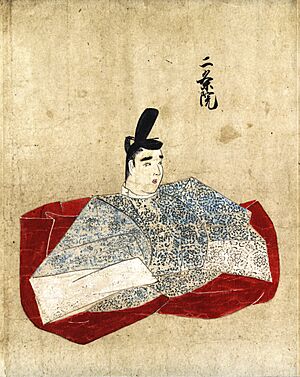Emperor Nijō facts for kids
Quick facts for kids Emperor Nijō二条天皇 |
|||||
|---|---|---|---|---|---|

Nijō, Tenshi Sekkan Miei
|
|||||
| Emperor of Japan | |||||
| Reign | September 5, 1158 – August 3, 1165 | ||||
| Coronation | January 11, 1159 | ||||
| Predecessor | Go-Shirakawa | ||||
| Successor | Rokujō | ||||
| Born | July 31, 1143 | ||||
| Died | September 5, 1165 (aged 22) | ||||
| Burial | Kōryū-ji no Misasagi (香隆寺陵) (Kyoto) | ||||
| Spouse |
|
||||
| Issue | Emperor Rokujō | ||||
|
|||||
| House | Yamato | ||||
| Father | Emperor Go-Shirakawa | ||||
| Mother | Minamoto Atsushiko | ||||
Emperor Nijō (二条天皇, Nijō-tennō) was the 78th emperor of Japan. He was born on July 31, 1143, and passed away on September 5, 1165. His time as emperor lasted from 1158 to 1165. He was a young ruler during a period of political change in Japan.
Contents
Emperor Nijō's Family Life
Before he became emperor, his personal name was Morihito-shinnō. He was the oldest son of Emperor Go-Shirakawa. Later, Nijō himself became the father of Emperor Rokujō.
Here are some of his important family members:
- His main wife was Imperial Princess Yoshiko. She was the daughter of Emperor Toba.
- Another important wife was Fujiwara no Ikushi. She was the daughter of Fujiwara no Tadamichi.
- He also had a daughter named Imperial Princess Yoshiko (born 1159, died 1171).
- His first son was Imperial Prince Priest Son'e (born 1164, died 1192).
- His second son was Imperial Prince Nobuhito. This son later became Emperor Rokujō.
Key Events in Emperor Nijō's Reign
Nijō was chosen to be the next emperor after his father, Emperor Go-Shirakawa.
- Hōgen 1 (1156): The retired Emperor Toba-in died at 54 years old.
- Hōgen 1 (1156): The Hōgen Rebellion happened. This was a big fight for power in Japan.
- Hōgen 4 (1158): Emperor Go-Shirakawa stepped down from the throne. His oldest son, Morihito, became the new emperor. This is when Emperor Nijō officially took the throne.
Even after Nijō became emperor, his father, the retired Emperor Go-Shirakawa, still managed most of the important government matters.
- Heiji 1 (1159): The Heiji Rebellion took place. This was another major conflict that affected the government.
- Chōkan 2 (1164): The former Emperor Sutoku passed away at 46 years old.
- Eiman 1 (1165): Emperor Nijō's young son was named the next in line to the throne. He would soon become Emperor Rokujō.
- Eiman 1 (1165): Emperor Nijō became very ill. He decided to step down from his role as emperor. His son then became Emperor Rokujō.
- Eiman 1 (1165): The former Emperor Nijō died at the young age of 22.
Important Court Officials: The Kugyō
The Kugyō (公卿) was a special group of very powerful men. They worked closely with the Emperor of Japan in ancient times. There were usually only three or four men in this elite group at any one time. These officials often came from important families and had a lot of experience.
During Emperor Nijō's reign, some of these top officials included:
- Kampaku, Konoe Motozane (a chief advisor)
- Sadaijin, Konoe Motozane (Minister of the Left)
- Udaijin (Minister of the Right)
- Nadaijin (Minister of the Center)
- Dainagon (Chief Counselor)
Eras During Nijō's Reign
In Japan, years were grouped into special periods called nengō. Emperor Nijō's reign covered several of these eras:
- Hōgen (1156–1159)
- Heiji (1159–1160)
- Eiryaku (1160–1161)
- Ōhō (1161–1163)
- Chōkan (1163–1165)
- Eiman (1165–1166)
See also
- Emperor of Japan
- List of Emperors of Japan
- Imperial cult
- Emperor Go-Nijō
 | Valerie Thomas |
 | Frederick McKinley Jones |
 | George Edward Alcorn Jr. |
 | Thomas Mensah |

